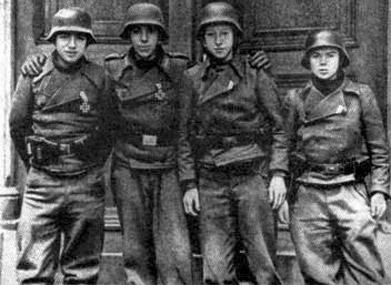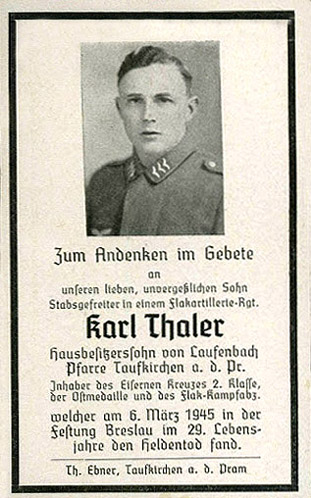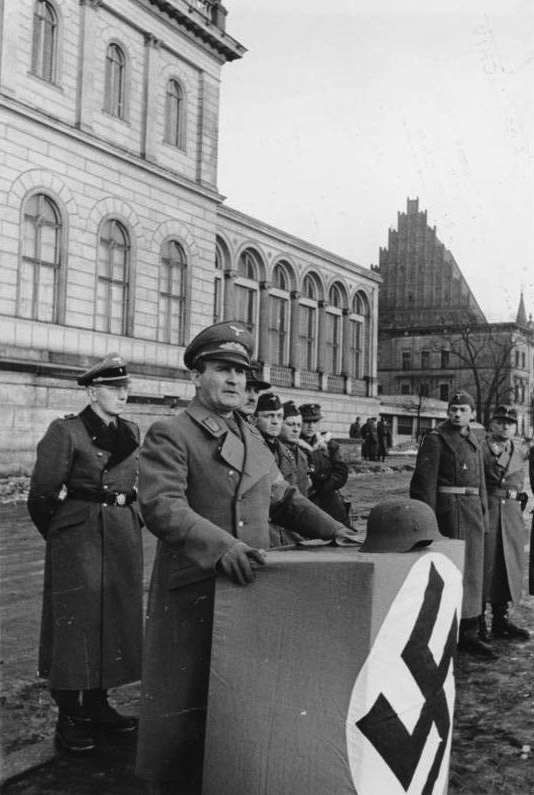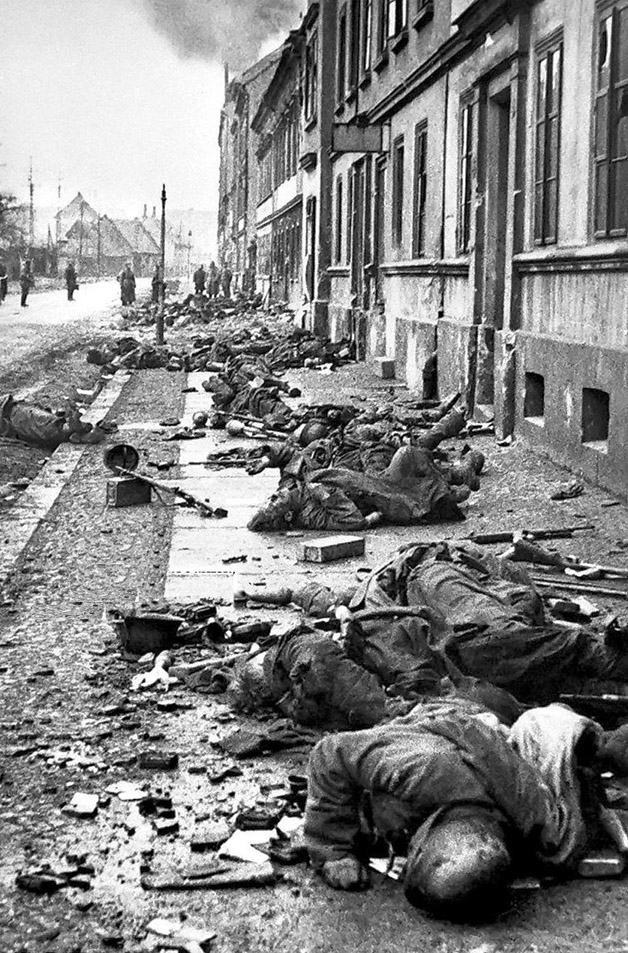This is a 1988 interview done with Peter Eichhorn, NSDAP official during the Breslau defense (Festung Breslau - Fortress Breslau), Nuremberg
[Above: Four little armored angels of the Hitler Youth. The last defenders of Fortress Breslau.]
Thanks for agreeing to talk with me; I would like to ask what attracted you to join the NSDAP as a start.
Peter: I am from the old German town of Breslau, which now lies in Poland behind the iron curtain. This area of Germany was very volatile after WWI, there were numerous problems with the newly created state of Poland, and this caused fears among many Germans. I was a very young boy after the war, but always tried to listen intently while adults discussed politics.
I would hear that Germany was forced into a war we did not want to fight, then betrayed by very wealthy Jews who turned on us as the British offered Palestine as a reward, which cost us the war once they brought America in. I saw all the wounded and damaged soldiers come home in 1918 and it angered me, which made me study more about why this happened.
As I was going through school, I would study the world news, and saw something that caught my eye in November of 1923. Adolf Hitler and his party tried to overthrow the Bavarian government, because they wanted to stop the reds, and save Germany. I started to read more about him and his ideas. A youth group had been formed and I joined this in 1930, but could only stay in for a year, as I was too old by this time.
I learned a lot during my time, understood a great deal about NS, and knew it was correct. Many Germans also were having an awakening you could say; they knew something was not right. Hitler and his party did a good job of showing solutions and winning people over. In 1933, I was working through school and had the idea I wanted to join the NSDAP and become a political leader. I met with my old HJ leader and he started me on the path. That is how I got involved.
What schooling did you have to do in order to become a political leader?
Peter: Well, first I had to be admitted to the party, which required a police check. Once in, I paid dues and met with my blockleiter who introduced me to the Kreisleiter for Breslau. I told him I was interested in becoming a leader and advance within the party. I believe this was 1935 and since I had a degree, I was recommended to attend political school to learn more about the NS idea and governing people and helping with their needs.
You must remember that the party was of the people and created to give the people a voice that had been denied to them by the monarchists. I heard our Gauleiter [NSDAP regional party leader-ed.] speak about how our gau [term for a region within a country-ed.] was getting grants to help rebuild a worn out and brittle infrastructure. This is something the people really wanted to see happen. The RAD had been created and was actively bringing modern roads and improvements to the area.
In the school I was attending, we learned the structure of the NSDAP, the history, the leaders, and reasons NS was a natural expression of human needs. The motto “your people are everything” could be seen posed in the study room and “no one shall go hungry, no one shall be cold” was in our dining hall. These reminded us of our mission to our people. You might be surprised that the party was not at all invasive in the lives of Germans. We were there if they needed us, but no one was forced to accept.
The NSDAP was the elected party of Germany, just like the parties of today. We had members, but no one was forced to join. If I remember, out of a population of 65 million only around 15 million were members. We stayed out of people’s way, and primarily governed our members and helped them if they needed it. We could step into squabbles with our members and offer non court judgements.
I came out of the NSDAP School and given the rank of blockleiter, where I was given a block area to oversee which was the center of town where I lived. I worked with every German agency to make sure all needs of the people were met in a fair and quick way.
They war changed things in a few ways, like rationing issues, and helping with morale. One could say that until the war, life was somewhat boring and bureaucratic. I was diagnosed with a severe heart murmur so I could not join the army, so I had to stay on the home front during the entire war.
I was told you worked with Gauleiter Wagner and others to make gun laws?
Peter: No, I was only appointed to a committee in 1937 to study German law regarding ownership of firearms. We reported that German gun laws were antiquated and unfair to the law abiding German citizen. We recommended that strict laws be eased and that there be no restrictions on gun ownership. German citizens were encouraged to own firearms, and to pass this right on to their children.
The only ones we clamped down on were Jews, due to the recent assassinations of NSDAP officials by Jewish assassins. You have heard of Ernst von Rath, but sadly, he was one of many who fell by Jewish killers. The night of broken glass was a result of these assassinations. It was recommended that no Jewish businesspersons be allowed to make or sell any weapons. It was feared they could give them to their kind to be used on us.
These recommendations were put into place as law in 1938; we lowered the age a person could buy a weapon from 21 to 18, allowed the ownership of as many weapons as a person wanted, and allowed for citizens to carry pistols at anytime and anywhere. This of course required a police permit showing proper understanding of use and the law. Many old laws were erased to reduce state power.
Hunting no longer required permits, as it was a citizens natural right to use the land as needed, the only exception was if you were trophy hunting, then a tax permit was issued to help pay for replenishment and conservation. Shooting clubs, and gun shows were promoted to every German, and children were encouraged to learn to shoot and hunt. The old restrictions of the Kaiser and Weimar eras were gone.
When you see the massed rally photos with the Führer, remember that there are thousands of people with firearms around him, many nonmilitary citizens. Testament of the trust he had in Germans, and Germans in him. Gun restrictions did not exist in Germany after 1933, and became law in 1938. That is a history lesson for you, young man.
[Above: A German death card of one of the tens of thousands of heroes who died protecting Fortress Brelau.]
Did you ever meet Hitler, or see him in person?
Peter: Yes, as a party member and low leader I was in attendance for the '36, '37, and '38 party congress in Nuremberg. I was able to shake hands with the Führer at the Deutscher Hof after the parade; he attended a party held by the gau Bayern leadership. He spoke about how proud he was of Germans for coming together to help the needy and bring up our people from poverty and depression.
For me this was the whole essence of the NS movement and thought, to make life worth living and happy for all people, that everyone pulls their share, but if unable help was given. The laws of our creator were honored, and we held that our blood and soil were sacred gifts to be treasured. The race of Europe was our holy bond to be promoted and protected from Jewish hate. For me it is an honor to say I have touched the greatest son my nation has borne.
What was life like in Breslau during the war?
Peter: Breslau was far enough away that we avoided bombings, earning a name of air raid shelter Breslau. It was so safe, that in 1940 many people came to the city from the west, as the British had been attacking. Children were also brought here, and we created special schools, and hostels to care for them. You would not think a war was going on in our city as it lived at peace.
There was plenty of food; I visited Gross Rosen camp in 1942, after an outbreak of meningitis and typhus at Auschwitz. Our security service believed Polish partisans started this outbreak by sending infected rats and feces over the fence during a warm night. This killed many hundreds and orders were to stop the spread and overcrowding. Many prisoners were brought to GR to ease overcrowding and guard against any sickness; they were put to work in nearby factories, which helped our labor shortages due to the war. I saw them being treated very well and with respect, even earning money to shop with.
I state that no prisoners were abused, killed, or harmed in this camp, a handful of criminals were executed I have heard, but that was for attacking other prisoners or sexual attacks at the factories. This camp was well managed and fair to the prisoners.
Life for me was good during this time, I was married and had a son, we would go on river cruises often to sightsee and enjoy nature. I had been promoted and had my own office, with good pay. My duties dealt with overseeing party dues and registration. I also volunteered to host receptions for returning soldiers on leave. I also could petition the military for release of soldiers who had losses where they were the sole heir to the family name.
Life did not get hard for the people until 1943, when total war was announced, which many people were surprised we waited so long to do. This mandated that more civilians had to be used for labor, so it forced a shutdown of many peacetime indulgences. Germany was now gearing up to fight the might of the combined world. Our city was still spared any air raids and the war still seemed very distant. I was not until late 1944 that things changed for us, the press and newsreels showed the front was coming closer.
In the late summer, on a day when the wind blew right I could hear distant rumbles of the fighting. Our soldiers were reporting total collapses of the front, and the overwhelming advantage of the Soviets, and of the crimes they witnessed them commit. These eyewitness accounts stiffened the resolve of the front.
You stayed in Breslau during the battle and siege, what was it like?
Peter: Our city, which now housed close to a million, was declared a fortress, as it was hoped we could hold up a large force and give time for a counter attack and refugees to get away. We had a new gauleiter, Karl Hanke, who was former military and holder of the Iron Cross and Panzer Badge. He was well respected and dated the most popular woman in Breslau. He worked with the city commander to start building fortifications for the defense, more prisoners were brought in from the eastern camps, and from Italy to help with this. I remember seeing train after train bringing in food and supplies.
[Above: Karl Hanke]
The civilians were urged to leave as early as November, but most refused, thinking the city would be spared as it had not been touched. My wife had family in Jena and left in December but I stayed as part of the defense. I was part of the inner city defense and organization, my main job was overseeing the medical help for the soldiers and civilians. I picked places to store medicine and supplies to protect them.
When more soldiers came into the city from recent battles, they urged the civilians to flee, telling horrid stories about what they saw in Poland and Hungary. The Soviet army was committing mass acts of murder for anyone fighting or aiding Germany. By January the front was on our doorstep, Soviet artillery was shelling the city, and we saw planes overhead for the first time. Our defenses were pitiful, we had nothing heavy to fight with, and I believe we could only muster two damaged heavy panzers.
Our soldiers put the Soviets on notice we intended to hold, and they repulsed many early attacks, causing heavy losses. This increased the artillery attacks, which now started to wreck the city. Our fire brigades were kept busy, and often had to just let whole blocks burn, the only mass effort was when people were trapped. Due to this, Hanke now forced the civilians to leave. Which many still defied us and wanted to stay put and help fight. An example I was with a police unit going door to door, and a family said this was their city, and they would die in it if it were Gods will. We stressed the Soviets would soon surround the city and were raping and killing, but they were unmoved.
I learned later, forced evacuations caused mass casualties as it was very cold [some estimates say 100,000 civilians froze to death! - ed.], and the planes strafed these long columns of refugees, killing thousands. What the planes did not claim the partisans did, who advanced with the Soviets, taking further tolls. The weather was brutal and anyone wounded had little chance to survive. It was pure hell as the enemy showed no mercy or compassion. They signed some parts of the Geneva Convention, but the main parts about prisoners of war and civilians they refused, to them it was no mercy in war.
Our men fought valiantly against overwhelming odds, and held out. This rag tag army consisted of both German and European volunteers. I counted Hungarian, Italian, Dutch, Polish, and Russians who stayed with us to fight. By April, the city was in ruins but our spirits were still high and we held the Soviets at bay. They did take our airport, but we had another built in my area, since the building had been destroyed, we plowed away rubble so planes could land to bring supplies and remove wounded.
This siege went on until the end in May. It was announced the Führer had fallen, and all over the Reich, any more fighting was senseless. Resisting the enemy would only bring suffering and losses that could be avoided. Many still did not want to stop, as they feared what would happen since they caused the Soviets heavy losses. Hanke was ordered out to take charge of the SS, and said goodbye. The army commander met with many groups and expressed his desire to save his soldiers. He was promised by the Soviets everyone would be treated well. This was a lie.
I had an aide who was a veteran of the front, and told me I should sneak out before the surrender, as political leaders were being shot outright. The day before our surrender, I gathered supplies, and took my aide and two women he knew who feared being raped. We knew the ground well, and went out at night. The Soviets lines were in full celebration and lucky for us, we could tell they were drunk as could be. We quietly snuck through very late and made it 7km from the city before daylight so we stopped to rest and eat. I remember it being very odd to not hear the war any longer.
We were close to a road, where we could see many civilians moving west, since it was warm, all uniforms were discarded and we blended into the refugees and moved west. I was astounded by the amount of debris I saw on this road, wagons turned over, dead, and clothes everywhere. Partisans had been let loose it appeared. I was by some former prisoners who still wore their striped uniform; even they had not been spared. They told of attacks by planes, and then partisans opened fire on them.
I burned my red political leader ID and anything that said I was a party member. From what I was hearing, anyone caught with NSDAP items was being killed. The one paper I did keep was my prized possession in these times, my military medical fitness document. I was finally stopped outside Dresden by a Soviet patrol, and I am sure I looked miserable. They saw my pass, issued me a medical civilian pass that allowed me to proceed to Jena, I was surprised it was that easy. I saw the ruins of Dresden, and masses still staying around the city. I was able to make my way to my wife; I kept low, and reported to the American army forces who issued me another pass showing I was a nonmilitary refugee.
I have read that many Germans were hung or shot on orders of party officials or SS, is this true?
Peter: No, this is a popular tale nowadays, where the winners would like us to believe they came to save all of us from a very bad regime. There is no lack of eyewitnesses or testimony that likes to cast the illusion that at wars end, roving bands of fanatics hunted down anyone they could find. This is all total nonsense, and war propaganda. As in most tales, there is a very small taste of truth.
I was present with GL Hanke in the main army headquarters when a request came in to execute a soldier who was an old communist and was caught urging men to surrender and join the Soviets. This was intolerable and high treason. The general signed the order and Hanke added his approval as well. These instances did happen, as in every army, but not very often.
In Fortress Breslau, I know of only a handful of men executed for looting, harming civilians, or trying to get men to defect. The Soviets sent spies into the city to try to get men to give up, some Poles did I understand. One spy was caught and shot along with the soldiers trying to leave with. There were police units who were tasked with stopping this, but they answered to the General and could not just carry out justice without orders. We had very few Waffen SS men, and certainly no roving bands of SS to round up people. What tales the communists and Allies have concocted. There was just a TV show on last night that showed this nonsense.
[Above: Human debris. The fallen paladins of Fortress Breslau.]







